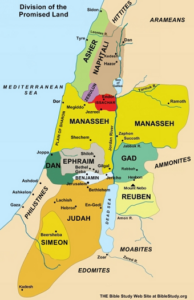
The Final Semitic-Jewish Exodus and the Full Life
All along the way, the Semitic-Jewish understanding is linked to the ownership of a certain land, and even the imperial struggles of our time do not reflect anything else than the attempt to colonize peoples and enslave them, that is, we have evolved in the technology used for the war, but not with the intention of perpetuating the power and acquiring goods of peoples and nations.
understanding is linked to the ownership of a certain land, and even the imperial struggles of our time do not reflect anything else than the attempt to colonize peoples and enslave them, that is, we have evolved in the technology used for the war, but not with the intention of perpetuating the power and acquiring goods of peoples and nations.
At the end of the Jewish-Semitic exodus, Moses sends Joshua and Caleb and 10 chosen men, one from each tribe, to spy out the land of Canaan to find out the conditions in the region, but he himself does not get there and dies beforehand.
These spies who go there find a good and beautiful land, however there were “giants” in it and the people were powerful, despite all 40 years in the desert, many Hebrews wondered if it was not better to have returned and thought that God had abandoned them .
However, the contrary report of Joshua and Caleb the land was very good and if the Lord had promised the possession of Israel he had to proceed until he took possession and despite many struggles they got there, then came the judges according to the biblical narrative, but the people asked for kings “like other peoples” and then came Saul.
Understanding this time, in addition to interpreting the inevitable influence of the Egyptians and the messianic spirit of the Hebrew people, must take into account that farmers and shepherds needed land, and even though the divine message was clear, theophanies instituted alliances and this also meant a behavior of justice and fraternity, they were still understood as being “a chosen people” this would not apply to other peoples.
Even a millennium later, as we said this period of the beginning of the Egyptian decadence is around the year 931 BC, the time that Jesus is born this needs to be corrected and the didactic difficulty of teaching the people the true teachings, and Jesus only brings a “new ” commandment (does not mean that the 10 of the covenant were wrong) “that you love one another” (John 13:24) and I want mercy and not sacrifice (Matthew 9:13).
Even so, the disciples were slow to understand, not understanding the sacrifice of Jesus on the cross, and the refusal of this sacrifice implied even greater throughout history: wars, exile, pests and famine, but the spirit of domination and colonization of peoples remains.
When explaining to his contemporaries in parables Jesus says how the divine kingdom is like someone who finds a treasure (Mt 13,46): “when he finds a pearl of great price, he goes, sells all his possessions and buys that pearl” and this should mean a greater good not only in human value, but in eternal and definitive values.
The Ipuwer hover found in Egypt at the beginning of its decadence says that the girls “stayed looking at themselves in the mirror for hours” and that the women who used to keep things in boxes “now wanted elaborate furniture” to store their things.
What are our pearls and our values that we want for a lifetime?









